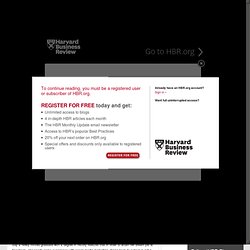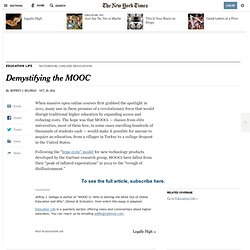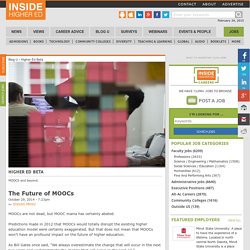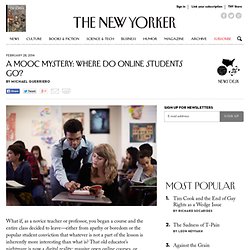

How B.F. Skinner Will Save Online Education. The Real Revolution in Online Education Isn't MOOCs. By Michelle Weise | 10:00 AM October 17, 2014 Data is confirming what we already know: recruiting is an imprecise activity, and degrees don’t communicate much about a candidate’s potential and fit.

Employers need to know what a student knows and can do. Something is clearly wrong when only 11% of business leaders — compared to 96% of chief academic officers — believe that graduates have the requisite skills for the workforce. It’s therefore unlikely that business leaders are following closely what’s going on in higher education.
Even the latest hoopla around massive open online courses (MOOCs) amounts to more of the same: academics designing courses that correspond with their own interests rather than the needs of the workforce, but now doing it online. But there is a new wave of online competency-based learning providers that has absolutely nothing to do with offering free, massive, or open courses. Competencies themselves are nothing new. The Year of the MOOC. That’s what everyone is trying to figure out. Many places offer MOOCs, and more will. But Coursera, Udacity and edX are defining the form as they develop their brands.
Coursera casts itself as a “hub” — Dr. Ng’s word — for learning and networking. The learning comes gratis from an impressive roster of elites offering a wide range of courses, from computer science to philosophy to medicine. While Coursera will make suggestions, Dr. No one showed at the meet-up that Stacey Brown, an information technology manager at a Hartford insurance company, scheduled for a 14th-floor conference room on a Thursday after work, despite R.S.V.P.’s from a few classmates in the area.
Demystifying the MOOC. When massive open online courses first grabbed the spotlight in 2011, many saw in them promise of a revolutionary force that would disrupt traditional higher education by expanding access and reducing costs.

The hope was that MOOCs — classes from elite universities, most of them free, in some cases enrolling hundreds of thousands of students each — would make it possible for anyone to acquire an education, from a villager in Turkey to a college dropout in the United States. Following the “hype cycle” model for new technology products developed by the Gartner research group, MOOCs have fallen from their “peak of inflated expectations” in 2012 to the “trough of disillusionment.” There are several reasons for the disillusionment. First, the average student in a MOOC is not a Turkish villager with no other access to higher education but a young white American man with a bachelor’s degree and a full-time job. The Future of MOOCs. MOOCs are not dead, but MOOC mania has certainly abated.

Predictions made in 2012 that MOOCs would totally disrupt the existing higher education model were certainly exaggerated. But that does not mean that MOOCs won’t have an profound impact on the future of higher education. As Bill Gates once said, “We always overestimate the change that will occur in the next two years and underestimate the change that will occur in the next 10.” MOOCS played a historic role in stimulating discussion in teaching across the academy. MOOCs engaged faculty and gave new legitimation to online education. MOOCs also provided an experimental space where content specialists, instructional designers, and educational technologists could test new pedagogies and teaching tools including auto-grading, interactive simulations, and educational gaming, MOOC Tracker. Massive open online courses – or Moocs – are web-based classes that offer students self-paced learning in their subject of choice.
Recently-listed free courses, on aspects of business, in our interactive directory include: Although Moocs are non-degree programmes, the content of many of these courses is often similar to that of a university-level programme. Some Mooc platforms, including Coursera and edX, partner with top universities to offer courses. Read instructions on how to use this directory. Please email forthcoming free business-related Moocs to ft.bized@ft.com Instructions on how to use this directorySearch for courses by adding keywords into the “Filter” field, for example, marketing.
You can sort the table by clicking on the column headings such as “Subject”, “Course name”, “School/ Organisation”, “Start date”, “Duration in weeks”, “Platform” and “Certificate”. Will Executives Get on the MOOC Train, Too? - At Work. A MOOC Mystery: Where Do Online Students Go? What if, as a novice teacher or professor, you began a course and the entire class decided to leave—either from apathy or boredom or the popular student conviction that whatever is not a part of the lesson is inherently more interesting than what is?

That old educator’s nightmare is now a digital reality: massive open online courses, or MOOCs, born a few years ago of the seemingly well-paired utopianisms of Silicon Valley and the élite American university, are seeing that classroom management can be a difficult task without a classroom. When the Times declared 2012 the “Year of the MOOC,” it seemed, in the words of the paper, that “everyone wants in,” with schools, students, and investors eager to participate. Beyond the Year of the MOOC. To get you started. For next time... An example.